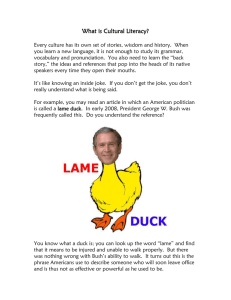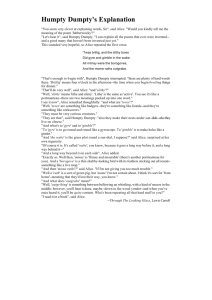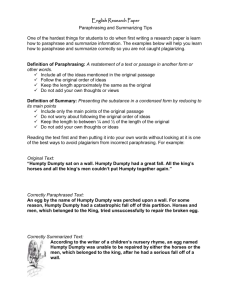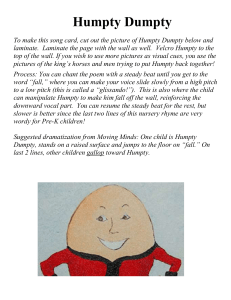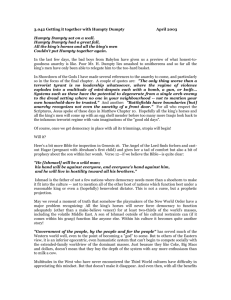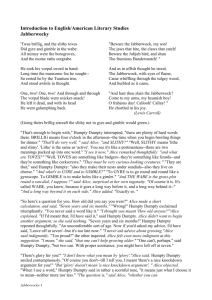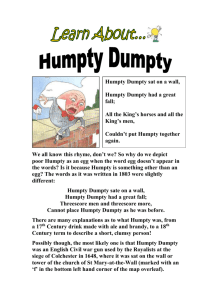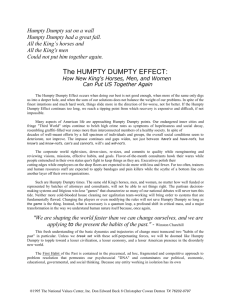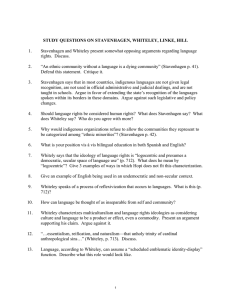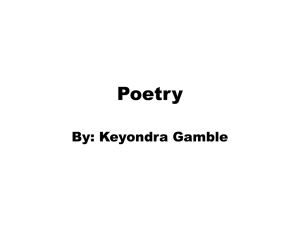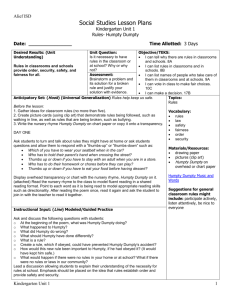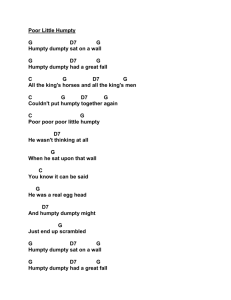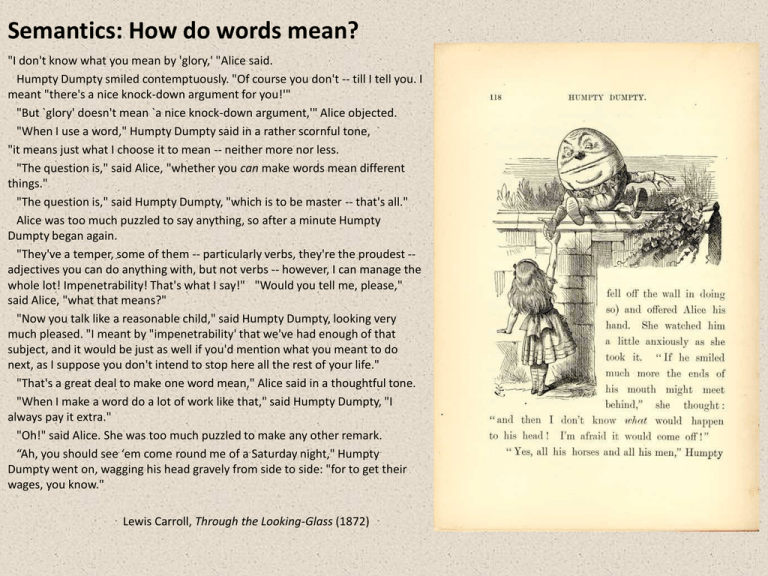
Semantics: How do words mean?
"I don't know what you mean by 'glory,' "Alice said.
Humpty Dumpty smiled contemptuously. "Of course you don't -- till I tell you. I
meant "there's a nice knock-down argument for you!'"
"But `glory' doesn't mean `a nice knock-down argument,'" Alice objected.
"When I use a word," Humpty Dumpty said in a rather scornful tone,
"it means just what I choose it to mean -- neither more nor less.
"The question is," said Alice, "whether you can make words mean different
things."
"The question is," said Humpty Dumpty, "which is to be master -- that's all."
Alice was too much puzzled to say anything, so after a minute Humpty
Dumpty began again.
"They've a temper, some of them -- particularly verbs, they're the proudest -adjectives you can do anything with, but not verbs -- however, I can manage the
whole lot! Impenetrability! That's what I say!" "Would you tell me, please,"
said Alice, "what that means?"
"Now you talk like a reasonable child," said Humpty Dumpty, looking very
much pleased. "I meant by "impenetrability' that we've had enough of that
subject, and it would be just as well if you'd mention what you meant to do
next, as I suppose you don't intend to stop here all the rest of your life."
"That's a great deal to make one word mean," Alice said in a thoughtful tone.
"When I make a word do a lot of work like that," said Humpty Dumpty, "I
always pay it extra."
"Oh!" said Alice. She was too much puzzled to make any other remark.
“Ah, you should see ‘em come round me of a Saturday night," Humpty
Dumpty went on, wagging his head gravely from side to side: "for to get their
wages, you know."
Lewis Carroll, Through the Looking-Glass (1872)
Natural (onomatopoeia)
•
•
•
•
•
•
•
•
•
as opposed to conventional
boom, mush, hiccup, splash
machines: beep, zoom, honk, zap
unrecognized: bleat (<ME blairt = blet)
broader category: ideophone (evokes a sensory
perception, not just sound)
bling(-bling), sparkle (visual)
badonkadonk (size, shape)
hippety-hop (manner)
a blog about ideophones!
• animal sounds: quack, moo, bark, woof, purr, meow, roar, baa
But note dog sounds in other languages (click here for more animals!)
•
•
•
•
•
•
•
•
•
•
•
•
•
•
•
•
•
•
Afrikaans: woef
Albanian: ham ham / hum hum
Arabic (Algeria): haw haw
Bengali: ghaue-ghaue
Catalan: bup, bup
Chinese (Mandarin): wang wang
Croatian: vau-vau
Danish: vov
Dutch: woef
English: bow wow, arf, woof, ruff ruff
Esperanto: boj
Estonian: auh
Finnish: hau hau /vuh vuh
French: ouah ouah
German: wau wau, wuff wuff
Greek: gav
Hebrew: haw haw (/hav hav)
Hindi: bho:-bho:
•
•
•
•
•
•
•
•
•
•
•
•
•
•
•
•
•
•
Hungarian: vau-vau
Icelandic: voff
Indonesian: gonggong
Italian: bau bau
Japanese: wanwan, kyankyan
Korean: mung-mung (/wang-wang)
Norwegian: voff / vov-vov
Polish: hau hau
Portuguese (Portugal): au au au (nasal
diphthong)
Portuguese (Brazil): au-au
Russian: gav-gav
Slovene: hov-hov
Spanish (Spain, Argentina): guau guau
Swedish: vov vov
Thai: hoang hoang (with falling tone)
Turkish: hav, hav
Ukrainian: haf-haf
Vietnamese: wau wa
Words and things
•
•
•
•
•
arbitrary relationship? (pig, table, ceiling)
words refer to things, or concepts of things?
harder with abstract words (popular, difficulty)
word refers to a concept?
meaning = use in language (children learn in
context)
Semantic categories
• Roget’s Thesaurus: abstract relations, space, matter,
intellect, volition, affections
• OED:
External world (universe, earth, living world, sensation,
matter, abstract properties, relative properties,
supernatural)
Mind (mental capacity, emotion/feeling, philosophy,
aesthetics, will, refusal/denial, having/possession,
language)
Society (community, inhabiting/dwelling, armed hostility,
authority, morality, education, religion,
communication, travel, occupation, leisure)
Relationships between meanings
• synonyms: no such thing: (happy/glad,
small/little)
• antonyms: easier (good/bad, hot/cold)
• gradable: hot/cold, fast/slow, handsome/ugly
• non-gradable: lay/clergy, dead/alive,
married/single
Imposing meanings on words
• arbitrary (coinage) Pandemonium = capital of Hell
(Milton, Paradise Lost)
• language conditions cognition (linguistic relativity,
Sapir-Whorf Hypothesis)
Denotation and connotation
• denotation: basic, specific, literal meaning of a word or phrase
as opposed to its emotional meaning and associations
• connotation: emotional meaning of a word; its implications,
suggestions, or associations, as opposed to its explicit literal
meaning
• rose (Shakespeare sonnet / botany textbook)
• emotive value: poor little boy vs. poor small boy
• lonely travelers
• historical change: appeasement
• “literary” feel: begin (OE) vs. commence (Latin)
• calling (OE) vs. vocation (Latin)
• lady vs. woman
Polysemy: “The fact of having several meanings; the
possession of multiple meanings, senses, or
connotations.” (OED)
• glass (substance) > drinking glass > glass (ellipsis)
• some kinds of words change readily (nouns, verbs, adjectives
adverbs), some less readily (prepositions, conjunctions,
articles, pronouns, auxiliary verbs)
• example: preposition for (= in front of)
1. support: (in support of: "I will vote for you")
(instead of: "they use string for shoelaces")
(because of: "she was jailed for her beliefs”)
2. obstacle (in spite of, notwithstanding: "A man's a man for
a' that" [Robert Burns]; “for all his faults, I love him still”)
• OED “for” (preposition): 30 pages, 11 main senses, 31
subsenses
Conservative semantics
• pen (Latin penna, wing, feather) - quill pen
• paper (Greek papyrus) - flowering plant
Cyperus papyrus
• electric (Greek, “pertaining to amber”)
• atom (Greek, “indivisible”)
• window (Old Norse vindauga “wind-eye”)
Radiation model of semantic change
head of the
department
60 head of
cattle
a dollar a
head
head
to lose
one’s head
head of the
page
to come to
a head
Concatentation model of semantic change:
cardinal < Lat. cardinalis < cardo (“hinge”)
pertaining to
a hinge
scarlet
cloak worn
by women
(obsolete)
(obsolete)
hinging, of
fundamental
importance
scarlet red
•cardinal
virtues
•cardinal
points of
compass
•(archaic)
(obsolete)
(noun) church
dignitary
bird with
scarlet
plumage
•(connected
to one of the
“cardinal”
churches of
Rome)
•(obsolete)
(current)
one of 70
ecclesiastics
in Pope’s
council
wear scarlet
hats and robes
(current)
Radiation + concatenation
•
•
•
•
cappuccio (Italian “hood”)
(concatenation) Capuchin monks
(radiation) capuchin monkey
(radiation) cappuccino
Figurative use of language (esp. metaphor)
metaphorical sense outlives literal sense:
• to thrill (originally, "to pierce" - cf. nostril
"nose hole")
• to fret (OE fretan "to devour")
• to depend (Latin dependere, "to hang from")
metaphorical and literal senses coexist:
• dull (lit. of things, also "slow-witted" or
"boring")
• bright (lit. of things, also "quick-witted")
Poetic imagination
•
•
•
•
daisy (day's eye)
tulip (Persian "turban")
easel (OE esel "ass" - bears a burden)
tribulation ("threshing" – suffering
has a purifying effect)
• extension of one sense to another (good taste,
clashing colors, soft voice, sweet sound, feel sorry
for someone)
• metonymy: "the figure by which an object or idea is
described by the name of some closely related
object or idea”
• container for thing contained: hot pot
• instrument for result: tongue for "language"
• material for product: nickel for "5c piece”
• synecdoche: “the figure by which the name of a
part is applied to the whole, or, conversely, the
name of the whole is applied to a part of it"
• all hands on deck, wheels, Washington
• generalization: narrow semantic range broadens
• quarantine (40 days -> any period of isolation)
• panier (breadbasket -> traveling container on
horse, bicycle, etc.)
• journey (day's walk or ride -> any trip)
• generalization leads to weakening
• lovely (worthy to be loved -> vague expression of
praise)
• great (very large in size -> another vague
expression of praise)
• good, nice, fine, excellent, etc.
• specialization: broad semantic range narrows
• generous = "of noble birth" -> having noble qualities
-> having the quality of open-handedness
• shrew -> unisex -> only of women
• starve = "to die" -> to die of hunger (and used
exaggeratedly of being hungry)
• older (general) sense exists alongside newer
(restricted) sense (usually in proverbs or
compounds):
• tide = time -> sea movement ("time and tide wait
for no one")
• cattle (< OF catel "property") -> agricultural
property (livestock) -> cows (archaic chattel retains
older meaning)
• euphemism: substitution of a word with a neutral
or pleasant connotation for one with an unpleasant
connotation
• (sex) whore (from Latin carus "dear, beloved”),
relations, intimate, sleep with, intercourse
• (illness): disease ("discomfort”), insane
("unhealthy”), social disease (STD), big C (cancer),
pass away (die)
• replacement of a word with the negation of its
opposite: untruthful, intemperate, unwise, impolite
• initials: b.m. for bowel movement, b.o. for body
odor
• slang used euphemistically: kick the bucket, croak,
buy the farm, push up daisies
• amelioration: a change to a more favorable meaning
• fame (< Latin fama "report, talk") – specialization,
amelioration
• admire (< Latin admirari ”to wonder, marvel at”)
• nice - once unfavorable (OF nice, from Latin nescius
"ignorant”)
• from 13th century, used in England with derogatory sense 16th specialized to mean "fastidious, difficult to please”
• but fastidiousness sometimes seen as evidence of good
judgment - late 18th c., extended to a general term of
praise
• narrower sense "precise, subtle" remains (a nice
distinction)
• usually a term of praise so general as to be meaningless
• pejoration: a change to a less favorable meaning
• more common than amelioration
• cnafa (OE "boy") -> knave (low economic status > bad manners, moral blame)
• churl (OE ceorl - not a noble, but not a slave)
• boor (OE gebur "dweller")
• villain (OF vilein "feudal serf")
• base (originally "of humble birth" - now, moral
unworthiness implied)
• lewd (OE læwede "not in holy orders" ->
"unlearned” -> MnE "lascivious, unchaste" specialization and pejoration)
• pejoration by overuse or being used insincerely or
patronizingly
• quaint ("skilled, clever" -> (13th c.) "cunning,
scheming") - also shifted to "handsome, elegant" ->
"unusual" -> (MnE: old-fashioned, a bit silly)
• silly (OE sælig "blessed" -> innocent -> harmless ->
weakly foolish > playful, jocular
• specious (Latin speciosus "beautiful" -> truthful ->
"giving the deceptive appearance of truth”)
• companion: pejoration then amelioration ("one who
shares bread" -> "comrade" -> (a good or a bad
thing) -> term of abuse (Shakespeare) - then lost
derogratory associations
• weakening: a decrease in the force or quality of the meaning of
a word
• ætwitan (OE "to reproach, blame for a very serious offense") ->
twit (to reproach someone mildly for a not very serious
offense) (or, as noun, a silly person)
• gilpan (OE "to boast") -> cry of an animal (based on metaphor,
reflects a dislike of boasting) -> an animal-like cry, from an
animal or a human
• giddy (OE "possessed by a god" -> "mad, foolish -> "frivolous,
flighty" -> "dizzy”
• procrastination causes semantic change! all the following
originally meant "at once, instantly”:
• soon, presently, by and by, anon
• weakening of intensives: "she's awfully nice"
• literally (as opposed to metaphorically) "The rock band was
literally blown right off the stage” – see Literally, A Weblog
• naughty ("worthless”); cf. naught (“nothing”)
• strengthening: an increase in the force or quality
of the meaning of a word
• divergence in meaning of related words, or
variant forms of same word
• encouraged if the words are pronounced
differently
• defy "to distrust" -> to challenge openly
• miser/misery - both < Latin miser ("wretched”)
• miser originally = "wretched person" - then
specialized to one form of wretchedness
(cheapness) - misery still means "wretchedness"
• word birth and death
• slang: generally comes about when there is already a
word or words for a concept, but appeals to people's
imagination because it expresses an old idea more vividly
than existing words
• slang words tend either to disappear or become standard:
• bet, fun, shabby, trip ("short journey"), blackguard, coax,
simper - all originally slang
• but booze (14th century) is still slang today
• dead words:
• rathe "early" ("The rathe primrose" Milton, Lycidas)
• but comparative (rather) remained and developed
• depart "to separate" - obsolete by 1661
• Anglican Prayer Book - wedding ceremony: Till death us
depart > Till death us do part > Till death do us part

